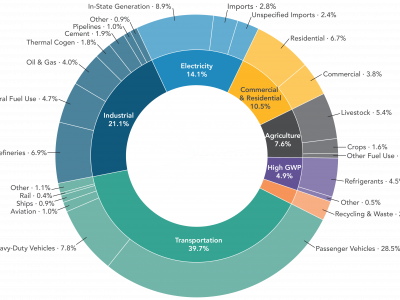Environment and Energy Impacts of the 2022 Election
The consequences will play out in D.C. and in some important states.
The President's party typically does poorly in the mid-terms, Biden's popularity is low, and Americans are upset about inflation. But the election didn’t produce the Republican wave many observers predicted in the last few weeks of the campaign. Although the GOP will likely control the House, the Democrats have held the Senate. Here’s where things stand and the policy impacts we can expect. Congress The House. It looks likely the Republicans will have a very ...
CONTINUE READINGA Stealth Climate Bill
There’s more money for climate action tucked away in a must-pass bill.
Surprise! The lame-duck Congress is about to consider another bill with billions of dollars of spending for climate adaptation and emission reductions. Another surprise: the bill is named for Senator James Inhofe. In case you’ve forgotten, he’s the climate change denier who once took a snowball to the Senate floor to disprove climate change. You might not guess that the bill is climate-related at all from the rest of the title either: the “National Defense Autho...
CONTINUE READINGTomorrow’s Elections: What Enviros Should Watch For
Who will control the House and Senate — and why it matters. [WITH NOV. 10 UPDATE]
Will Biden be able to pass new climate legislation in the next two years? Will EPA be shut down due to budget disputes? Will he be able to add any new judges to balance Trump’s anti-regulatory appointees? Can Biden appoint new administrators to serve the next two years? How much will the Administration be hammered by hostile committees or impeachment efforts? The answers depend on what happens tomorrow night. Right now, election prospects have revert...
CONTINUE READINGThe Supreme Court’s Earliest Pollution Cases
Long before Congress, a notoriously conservative Court started taking pollution seriously.
Well over a century ago, the Supreme Court ruled that it had that power to remedy interstate water pollution. That was in 1901. Six years later, the Court decided its first air pollution case. Notably, these cases came during the conservative Lochner era when the Court was hardly known for its liberalism. Quite the contrary. Yet the Court didn't hesitate to address pollution issues. The water pollution case was Missouri v. Illinois. In a feat of engineering prow...
CONTINUE READINGDo Trump-Appointed Judges Differ when Deciding Environmental Cases?
Student analysis identifies disparities in judicial outcomes
(This post was authored by Grayson Peters, a JD candidate at Berkeley Law and CLEE research assistant.) Do federal judges appointed by former President Trump rule differently in environmental disputes than judges appointed by other presidents? An analysis by two Berkeley Law students finds that they do in a few key areas of judicial decision-making. Between fall 2021 and summer 2022, we read and categorized over 270 judicial decisions across two cohorts: one cohort...
CONTINUE READINGBrazil: Presidential Election, Saving the Amazon, and Combating Climate Change
Views from the Governors’ Climate and Forests Task Force
By Jason Gray and Colleen Scanlan Lyons Co-Project Directors, GCF Task Force Yesterday, the people of Brazil had a historic vote in favor of returning President Luiz Inácio Lula da Silva (Lula) to power. Lula, who served as President of Brazil from 2003 to 2010 (and is the first President in Brazil to return for a third term), is known for his support of governmental policies that favor the environment and disenfranchised social groups. Deforestation in the Amazon d...
CONTINUE READINGGCF Task Force Exchange of Experiences in San Martin, Peru
Notes from the Field
From October 10-13, 2022, the Governors’ Climate and Forests Task Force (GCF Task Force) – a project of the Emmett Institute on Climate Change and the Environment at UCLA School of Law and UCLA’s Institute of the Environment and Sustainability, in partnership with the Institute of Behavioral Science at the University of Colorado, Boulder – and the Regional Government of San Martin, Peru, organized a Technical Exchange of Experiences in and around the towns o...
CONTINUE READINGCalifornia’s Secret Weapon: The Scoping Plan
There’s no substitute for a comprehensive policy vision.
The scoping process has been key to California’s success in cutting greenhouse gas emissions. The process requires the government to assess past progress, project future emissions, and come up with a strategy to meet its climate goals. In contrast, in many states – and at the federal level – there’s no real mechanism for a comprehensive look at climate policy. The State of New York most recently adopted the scoping process as part of an aggressive new schem...
CONTINUE READINGEPA Proposes Rejection of San Joaquin Valley Air District PM2.5 SIP Submittal
Emmett Institute White Paper Cited to Demonstrate Proposal’s Insufficiency
Earlier this month, EPA announced its proposed disapproval of San Joaquin Valley’s State Implementation Plan (SIP) submittal to address fine particulate matter (PM2.5) pollution. Among EPA’s reasons for proposing disapproval of the plan: The strategies to reduce building heating emissions—from things like water heaters and space heaters—were inadequate because they failed to consider zero-emission standards. In underscoring the inadequacy of the submittal’s ana...
CONTINUE READINGCongrats to Ann Carlson on Taking Top Post at NHTSA
Steve Cliff returns to California ARB
Belated congratulations to our UCLA Law colleague Ann Carlson on taking the top post at the National Highway Traffic Safety Administration. Ann has been on leave from UCLA since being appointed as NHTSA's chief counsel in 2021. She was recently tapped to be the Acting Administrator of the agency, filling the role that Steve Cliff left to return to California as Executive Officer of the California Air Resources Board. As many of our readers know, NHTSA is responsib...
CONTINUE READING









